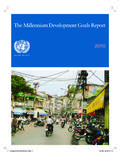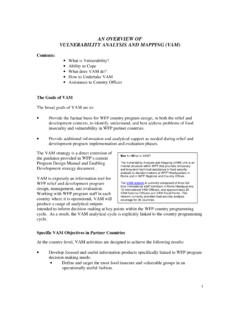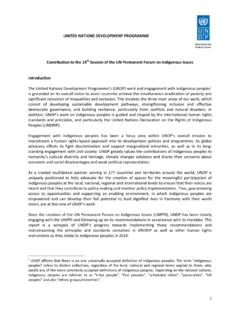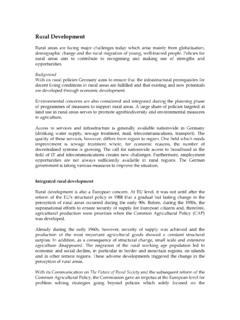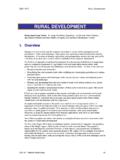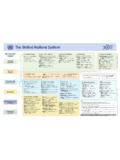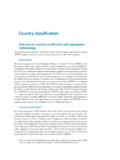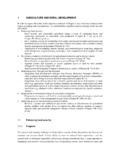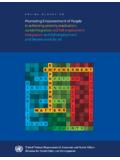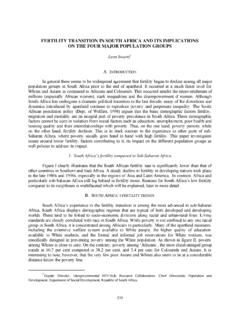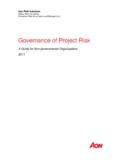Transcription of Poverty reduction - United Nations
1 S o c i al A f f a i r sE c o n o m i c & United NationsReport of the Committee forDevelopment Policy on the sixth session(29 March 2 April 2004)Designed by the Graphic Design UnitOutreach DivisionDepartment of Public Information46405 December 2004 2,655 Pove rt y reductionand good governanceDDeeppaarrttmmeenntt ooff EEccoonnoommiicc aanndd SSoocciiaall AAffffaaiirrssPoverty reductionand good governanceReport of the Committee for Development Policy on the sixth session(29 March 2 April 2004)asdfUnited NationsNew York, 16/03/2005 11:26 AM Page iDESAThe Department of Economic and Social Affairs of the United Nations Secretariatis a vital interface between global policies in the economic, social andenvironmental spheres and national action. The Department works in three maininterlinked areas: (i) it compiles, generates and analyses a wide range of economic,social and environmental data and information on which States Members of theUnited Nations draw to review common problems and to take stock of policyoptions; (ii) it facilitates the negotiations of Member States in manyintergovernmental bodies on joint courses of action to address ongoing oremerging global challenges; and (iii) it advises interested Governments on the waysand means of translating policy frameworks developed in United Nationsconferences and summits into programmes at the country level and, throughtechnical assistance, helps build national Nations publicationSales No.
2 92-1-104529-0 Copyright United Nations , 2005 All rights reservedPrinted by the United Nations Publishing SectionNew 16/03/2005 11:26 AM Page iiForewordAt its sixth session, the Committee for Development Policy contin-ued its practice of addressing a number of development issues receiv-ing attention in the international community. On this occasion, theCommittee focused on resource mobilization in the least developedcountries (LDCs), the measurement of progress in improving gover-nance, and transition strategies for countries that graduate from thelist of the overall global objective of reducing Poverty byhalf by 2015, a central challenge remains that of improving the eco-nomic and social conditions of the more than 600 million inhabitantsof the LDCs. To meet this challenge, the Programme of Action forthe Least Developed Countries for the Decade 2001-2010 calls forgrowth rates in the LDCs of at least 7 per cent a year and investmentrates of 25 per cent of gross domestic product.
3 Achieving these tar-gets will require the mobilization of substantial financial resources,domestically and externally. Domestic resources are indispensable foreconomic growth, for increasing human capabilities and for makingprogress in eradicating Poverty . External receipts in the form of offi-cial development assistance (ODA), revenues from trade, workers remittances, foreign direct investment (FDI) and other privateflows play an essential role in complementing domestic Committee addressed each dimension, identifying obstacles toand measures for mobilizing resources to achieve the targets set by theProgramme of Action. good governance can be instrumental in achieving povertyreduction. It is important both as a social goal and for its role in sup-porting an equitable pattern of growth. The challenge is to buildcapable governments that can guarantee peace and security, providean enabling political and legal environment for development and pro-mote equitable distribution.
4 Despite the increased emphasis beingplaced on improving governance , it is difficult to judge success inachieving it. The Committee therefore examined how to evaluateprogress towards good governance in the context of the quest toachieve the Millennium Development Goals. Measuring progressPoverty reduction and good 16/03/2005 11:26 AM Page iiiinvolves deciding, among other questions, whose criteria are beingused to evaluate progress and who does the measuring. TheCommittee concluded that good governance can contribute to pover-ty reduction only if its measurement and assessment is oriented tonational requirements and conditions and is not biased towards exter-nal Committee also dealt with matters related to its trien-nial review of the list of least developed countries and made propos-als on smooth transition strategies for countries that graduate fromthe list of least developed present volume contains the report that the Committeesubmitted to the United Nations Economic and Social Council onthese matters, as well as two papers, each prepared by a member ofthe Committee, that were used to assist the Committee in its deliber-ations.
5 It is hoped that the analyses and recommendations that thesedocuments contain will enhance discussions on development at alllevels, will contribute to improved policies and actions and, as theultimate objective, will play a role in improving the well-being of theworld s Antonio OcampoUnder-Secretary-Generalfor Economic and Social 16/03/2005 11:26 AM Page ivPrefaceThe Committee for Development Planning was established in 1965as a subsidiary body of the Economic and Social Council. Its originalterms of reference were subsequently modified and, in 1998, theCommittee was renamed the Committee for Development Policy(CDP).The Committee provides inputs and independent advice tothe Council on emerging cross-sectoral development issues and oninternational cooperation for development, focusing on medium- andlong-term aspects.
6 The Council is an intergovernmental body respon-sible for formulating policy recommendations to Member States andto the United Nations system on matters pertaining to is also responsible for coordinating the work of the United Nationsspecialized agencies, its own subsidiary functional commissions andthe five United Nations regional year, the Council advises the Committee about thetheme(s) that the Committee should consider at its annual General Assembly, the Secretary-General and the subsidiarybodies of the Council can also propose, through the Council, issuesfor consideration by the Committee. In addition, the Committeeitself often makes suggestions to the Council concerning its workprogramme. The Committee is also responsible for undertaking, onceevery three years, a review of the list of least developed countries(LDCs), on the basis of which it advises the Council regarding coun-tries which should be added to the list and those that could be grad-uated from the list.
7 In its identification of LDCs, the Committeeconsiders three dimensions of a country s state of development: (a) itsincome level, measured by gross national income (GNI) per capita;(b) its stock of human assets, measured by a Human Assets Index(HAI); and (c) its economic vulnerability, measured by an economicvulnerability index (EVI).The annual meeting of the Committee usually takes place inMarch or April of each year and lasts five working days. During thisperiod, the Committee discusses the agreed topics and drafts its ownPoverty reduction and good 16/03/2005 11:26 AM Page vviPrefacereport on the basis of inputs from members. The report is subse-quently submitted to the Council at its substantive session in July andis also disseminated among the development reports of the Committee are available on the Internetat and participation inthe sixth session of the CommitteeIn accordance with the resolutions of the Council, the Secretary-General nominates 24 experts, in their personal capacity, as membersof the Committee for three-year terms.
8 The Council has responsibil-ity for deciding on appointments to the Committee. In making thenominations for the Committee, the Secretary-General takes intoaccount the need to have a diversity of development experience,including ecologists, economists, and social scientists, as well as geo-graphical balance, gender balance, and a balance between continuityand change in the membership of the Committee. The membersappointed for the term starting on 1 January 2004 and expiring on31 December 2006 are as follows: Ms. N Dri Th r se Assi -Lumumba(C te d Ivoire)Research Associate, Universit de Cocody; Ms. Patricia Bifani-Richard(Chile-Italy) Psychologist,Sociologist; Mr. Albert Binger(Jamaica) Professor and Director of theCentre for Environment and Development, University ofthe West Indies; Mr.
9 Olav Bjerkholt(Norway) Professor of Economics,University of Oslo; Ms. Gui Ying Cao(China) Research Scholar, InternationalInstitute for Applied Systems Analysis; Mr. Eugenio B. Figueroa(Chile) Executive Director of theNational Centre for the Environment; 16/03/2005 11:26 AM Page viPoverty reduction and good governancevii Mr. Leonid M. Grigoriev(Russian Federation) DeputyDirector, Expert Institute; Mr. Patrick Guillaumont(France) Chairman, Centre forStudy and Research for International Development; Ms. Heba Handoussa(Egypt) Adviser, Economic ResearchForum for Arab Countries, Islamic Republic of Iran andTurkey; Mr. Hiroya Ichikawa(Japan) Professor of Economics,Department of Comparative Culture, Sophia University; Ms. Willene Johnson( United States of America) Adviser,Board of Governors, Federal Reserve System; Ms.
10 Marju Lauristin(Estonia) Professor of SocialCommunication, Department of Journalism andCommunication, Tartu University; Mr. Milivoje Panic( United Kingdom of Great Britain andNorthern Ireland) Fellow of Selwyn College, University ofCambridge; Mr. Eul Yong Park(Republic of Korea) University Chair andProfessor of Economics and Management, HandongUniversity; Ms. Carola Pessino(Argentina) Professor, UniversidadTorcuato di Tella, and Executive Director of the Centre forSocial Economics Evaluation and Research for PovertyAlleviation; Ms. Suchitra Punyaratabandhu(Thailand) Dean, School ofPublic Administration, National Institute of PublicAdministration, Bangkok; Mr. P. Jayendra Nayak(India) Chairman and ManagingDirector of Unit Trust of India Bank, Mumbai Ms. Sylvia Saborio(Costa Rica) Development Consultantand Adjunct Professor, Georgetown University, Washington, ; 16/03/2005 11:26 AM Page vii Mr.
